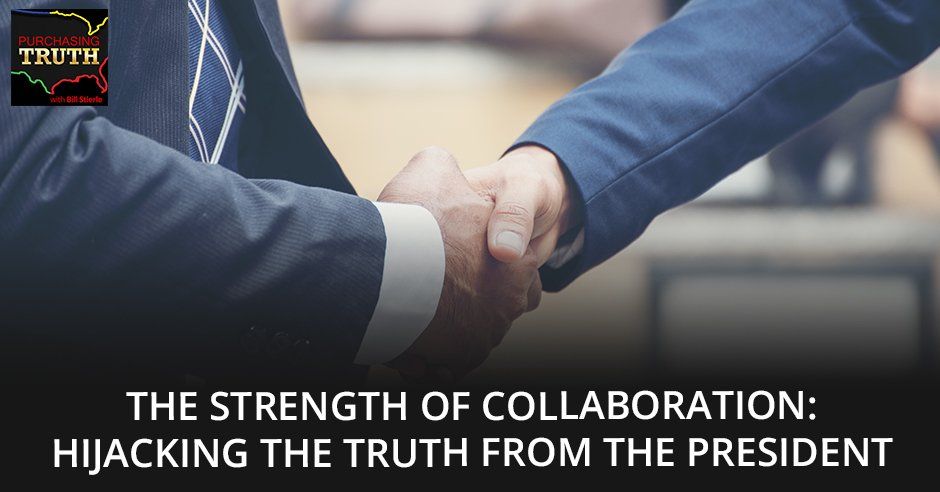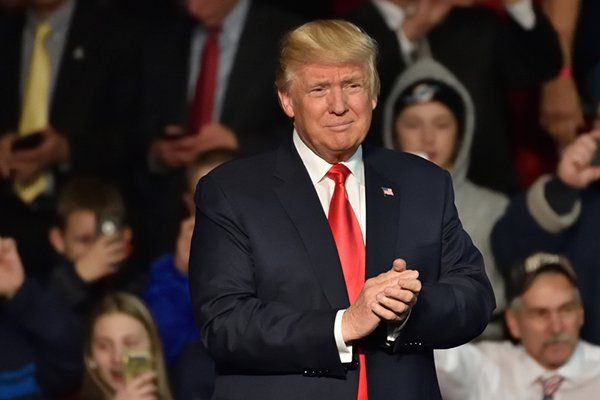The Strength Of Collaboration: Hijacking The Truth From The President
Subscribe Today!
Millions of Americans tune in daily to Donald Trump’s coronavirus briefings expecting to hear much-needed information on the virus and the lockdown, only to be bombarded with the usual “me” narrative of how he is in charge of the situation. There is no collaborative experience in these briefings, and yet collaboration is the very thing we need the most as we go through this crisis. In this episode, Bill Stierle and Tom berate how Trump turns his briefings into cheerleading sessions devoid of substance that is actually of value to the viewing public. Clearly, it is time to hijack the truth from the president. Journalists need to get inside Trump’s “me” narrative and use it to segue into the “we” narrative to change the nature of the coronavirus briefings into something the American people can benefit from.
---
Watch this epsiode here
Bill, I want to pick up a little bit from where we left off last time talking about the strength of collaboration and how we can try to change the nature of what happens in these daily Coronavirus briefings/stump speeches now for the Commander in Chief. What do you think about that?
It’s disheartening because the need for truth gets lost if it’s not a collaborative truth. If two people are trying to find truth, one person is trying to prove truth and one person is trying to win on their perspective of truth. They’re very much as you and I’ve talked about in the past. It’s a push style narrative. It’s the survival of the fittest style narrative of, “I am going to win and I’m going to stay until I get the last word. I am not going to consider what you’re saying and I’m most certainly not going to use accuracy on language.” One of the things that I think I would like people to get ahold of regarding truth is that Donald Trump is not accurate with his language. He’s exaggeratory/expansive with his language. Words like ‘all’ and ‘never’ and ‘absolute commander’, he’s not doing himself any favors. He doesn’t know that because he’s a marketing and salesperson. He’s a branding type of person. He’s not an implementer. He’s not a service-oriented person, so he’s not going to have that language, Tom. He has to fight because that’s the only thing he has.
Collaboration is like a foreign concept to him and/or a weak concept to him. If you look at any of these daily briefings, this is a serious power over narrative that goes on here and it’s very easy to see truth get trampled on here.
To bring up another example of this is that if I’m looking to meet my need for respect, then I am going to make a statement that’s going to align myself right next to other respectful people. He actually did that in one of the press conferences. He started listing a name of CEOs that he was going to be speaking with later, but he just kept going down all these different CEOs. First, he started with all the bank people. He started reading that the CEO of Chick-fil-A, the CEO of Burger King, the CEO of Pepsi and it was like, “Are we having a discussion about COVID? Why are we talking about those people now?” The topic moved from the financial piece because he started with the banks and it turned into the jobs piece/reopen the country piece, which is a part of the story narrative that they’re trying to get in front of, which is that they will tend not to do that. The public knows and they start losing energy as soon as they see that you put the same shiny lure in front of them. That’s why fishing lure companies have to come up with new fishing lures because the old fishing lures don’t work as well. They can’t trick the fish as much. You’ve got to make a new lure, shinier bells and whistles, whatever you need and then the fish will not believe it’s true. That’s called a collaborative experience. Something new and then it becomes old and you can’t use it anymore.
One of the things that seem painfully obvious to me, at least from my perspective, is that we are in a global health crisis. The entire world, there’s no country that’s going to be spared from this. All Americans are feeling vulnerable, isolated. There are many different things I’m sure they’re all feeling, but there is an overwhelming sense that this is happening to everyone, whether you’re ill or not or you’ve lost a loved one due to COVID-19 or not. It’s obvious that there’s this we aspect, this we experience that it’s all of us. This is not an individual. It’s not just on the news, somebody distant and far away. This is coming up to all of our front doors in one way or another. These daily Coronavirus press briefings, there’s not a sense of we in there.
It’s the we narrative. Imagine what it would be like if there were a unified experience rather than a me experience. The unified experiences handing things off that each expert is giving a piece of message that is valuable rather than here’s a respectful person standing behind me that because I’m going to glean respect off of that person by keeping them on stage. He’s done that many times. He’s put Chris Christie behind him. As long as the person has enough respect, he’ll drain the respect off of him. As the news media is doing, it’s like, “Why is Anthony Fauci standing behind him in the cold for two hours? Why is he doing that?” The truth is because Donald Trump is meeting his need for respect by keeping him there. It’s a different kind of social proof.
Is it a social proof or is it associative proof?
Associative proof, society pushes respect. If you take pictures, Tom, standing next to different celebrities, your need for respect goes up. What is Tom doing to hang around with these famous people?
I would think in the eyes of a lot of people, your “street cred” goes up.
Part of the daily briefings is, “I’m in charge of this thing. It’s survival of the fittest. I am fighting for you. That’s why I’m standing here for two hours. I’m fighting for you.” He believes it. That’s another challenge. His belief structure is that all I’ve got to do is be in front of people and talk to them and they will get me what I want. He has a winning formula. He has 70-plus years on this one. He has this. He has the evidence that all he’s got to do is stand there and allow things like powerful, amazing, extraordinary, wonderful job, all those adjectives come out like us and associated with himself. Meanwhile, the collaboration and cooperation are not there.
Honestly, the journalists in the press corps who are in the room for these briefings are not doing themselves or I think the rest of us citizens any favors most of the time. They engage in nothing but fact-checking, asking questions to try and get an answer they know they’re not going to get. It becomes combative with the President and this power over narrative where he labels them, diagnoses them as fake news, terrible journalists and all this stuff. How long is the press corps going to take this before they realized their approach is not working?
I feel sad about those and disheartened about this. They don’t have the awareness or the skill to get there. As somebody that can stand in front of a room of 250 screaming people and be able to reduce the conflict inside the room and get them to be collaborative in a short amount of time. Somewhere between 17 and 23 minutes, I’ll get everybody working together. It’s like, “How do you do that?” A big part of this truth narrative that we’re working on areas that we’ve got to get the concept of mutual respect to show back up. Can I respect Mitch McConnell’s point of view? Can I see what he’s going for and still be able to enlist him to do something on my behalf? That’s a tough stretch because his mindset is, “All I’ve got to do is keep doing it this way and I’m going to get my way as well as the people that are funding me their way.”
Bill, let’s say though you don’t have respect for Mitch McConnell or you’re an individual that doesn’t have respect for President Donald Trump. Can’t you still empathize with them to the point where they at least believe you’re showing them respect or that they’re being heard and then you can get to the truth more easily that way?
You can. It doesn’t necessarily mean they’re going to agree, but they will be less volatile and less hostile. Push some things in your direction just to make sure they can get half the votes that they need or be able to score points because they trout you out as somebody that they’ve been able to work with. It’s challenging when a few people’s belief structures, whether it’s people that can pay for it, people are wealthy enough to pay for influence or people that are in the position of the decision-making. They’re saying, “I’m not doing this because my people don’t want that.” That’s hard because it’s exclusionary. Charles Darwin said this best at the end of one of his books.
He said, “I’ve come to realize that it’s not survival of the fittest that makes the difference. It’s species co-evolving together that engages the process of evolutionary change.” Now you’ve got to think how weird that is. Is that engaging the process of evolutionary change? That is a balance between the things that other animals are doing and other plants are doing and the things that we’re doing as human beings as a part of that bigger system to co-evolve together. Science has helped us with the co-evolving because we’ve been able to help crops change faster by genetic manipulation. We’ve been changing crops for years, but we’ve been doing it now from the inside out. There are certain species and certain animals that haven’t done well because we haven’t found them as valuable. That’s problematic.
That still sounds a little bit like cooperation and collaboration, what you were saying there about co-evolving together.
Co-evolving together with the Republicans would be saying, “Here’s what fiscal responsibility looks like. Here’s how to infuse capitalism to make capitalism work. Here’s what the societal safety nets are in order to take the overwhelm, the panic.” As one TED Talk I watched from this billionaire person, he goes, “If we don’t cut it out, the pitchforks are going to at the gates of our gated community, just like they were in seventeenth century France.” If you keep doing it this way, they’re coming. He was talking to his fellow millionaire, billionaire people. He goes like, “You can’t keep doing it this way because they’re coming. It might not happen in my lifetime or yours, but if we keep going this way, this will not end well for our society and not end well for the future of America.”
There’s this tension. It seems there’s this struggle constantly I think between we narratives and me narratives, and maybe not just narratives, but realities of life. We’re all in this together and if we don’t cooperate and work together, a lot more people are going to get sick and die. We all also have a need to try to keep ourselves as individuals safe to try to advance our little family unit in our home forward and that’s sort of a me narrative or a lesser we. There’s this constant struggle. It’s striking to me how much these daily Coronavirus briefings that are supposed to be providing Americans much-needed information end up being just all about me, Mr. President, the job that I’m doing, and the job that my administration is doing. Nobody could have seen this coming. It’s all me.
We love freedom. Americans love freedom and we like independence. We want to be able to do whatever we want, say what we want, our individual rights, things. Even with the march on the State Department in Michigan, it wasn’t a tremendously large march, but there are a lot of people, they’re going like, “I’m going out because I don’t want anybody to stop me from getting my hair cut and colored and stuff. I don’t want to go out because this,” and there was like a Donald Trump parade there. The need for freedom, the need for independence are valuable needs. They can go to a certain length. There is a balance of the pushback. Even the President has trouble with this concept. Is it a state’s rights or am I the ultimate Commander-in-Chief? We could go, “It was state’s rights.” The states are in charge of this. We’re in the back. We’re the backup. “I thought you guys were backups?” “No, whatever I say goes.”
Isn’t that interesting how that flipped? It was like, “It’s up to the states.”
Stop trying to fight to get the truth from the person who is not going to give it to you.
CLICK TO TWEET
They’re going to arm themselves.
They’re going to force stay-at-home rules or not. That’s up to the states and then when it comes to opening up the economy, “That’s my decision.”
The weird part about it and what Donald Trump doesn’t get and doesn’t have any awareness about, you figure he would, but because the success rate is not great on this one that the people rebel by not following him anymore. The people rebel by not buying his product anymore. He doesn’t realize all the times he had all the bankruptcies is because of the same thing. It’s that, “Tom, I am not going out until I have trust with somebody that I trust, not somebody that I don’t trust.” He can stand and say, “Go back to work,” and I’m not. There are many Americans, especially because the safekeeping brain is in the position that it’s in, that they’re locking down and they’re not going. Next time, we need to talk about the new type of journalism that needs to take place with the journalist.
What I would request the journalists to do, and one of them didn’t push it, didn’t ask it in a way that was effective, is how do you instill confidence in the people they’re staying at home when there’s no contact tracing and there are not enough tests around? How do you give them trust to go back to work when we’re in this experience? How do you do that? You can start floating ideas as Gavin Newsom did. He said, “You might go to a restaurant. You might be wearing masks and the waiter might be wearing masks. The menus will be all disposable.” I’m thinking, “Why don’t you guys just get the testing done and your temperature is going to be taken when you arrive inside the restaurant? There’s going to be somebody there.” What’s that going to be like? It’s like, “Who wants to go there?” It’s like there is a social disconnect to, “Is there a germ around or not?” “We don’t know. We’re going to scare the crap out of you. We’re going to take your temperature.” It’s like that level is going on.
It’s unsettling and the journalists have got to do a better job of being empathetic and compassionate for Donald Trump’s optimistic statements and be ready for him to walk it back and give him an out. “Mr. President, I know that you were being optimistic about the 15th. Remember when you were being optimistic about people going back to church? You liked the economy to be opened up on the 1st, but you’re not sure, but you just want to be positive about the 1st of May.” “Yes,” he says. “You want to be a cheerleader, lead us forward and have us go back to work so the economy gets going. Is that right?” “Yes.” All of those things are easy for him to say yes to and saying, “Mr. President, I see that you’re working the issue here and you’re being optimistic. Is it okay if I ask a couple of technical, medical questions for a moment?”
What you did is given an opportunity for Dr. Anthony Fauci to come up. Donald Trump gets off the stage and Dr. Anthony Fauci comes up because you said, “I have a question about the way the virus works. Is it okay if I could talk to Dr. Anthony Fauci on this?” If Donald Trump says no, the game has changed for Donald Trump. Donald Trump has to say yes as a pattern of, “Yes, this is what I’m doing. Yes, this is my role. Thank you for acknowledging me for being a cheerleader and being optimistic.” You say, “I have a technical question regarding how the virus works.” Now you get the President off the stage. He now lets the dancer or the singer come up.
It seems then what the journalist would have done if the journalist was Bill Stierle is to say this is to hijack truth from the President in his own briefing to get it back on track to the real truth.
Stop trying to fight to try to get the truth from the person that’s not going to give it to you. At the same time, you also don’t want to pin Dr. Anthony Fauci against Donald Trump, which some of the reporters have done. It gets tricky. You want to get the truth out of him knowing that he has certain limitations too. Notice I’m in a question-asking narrative.
Bill, that will be fun next time to go into that new level of journalism that’s needed.
It’s an impactful questioning to pursue truth rather than the inquiry that they’re doing.
Thanks, Tom. I appreciate it.
Love the show? Subscribe, rate, review, and share!









